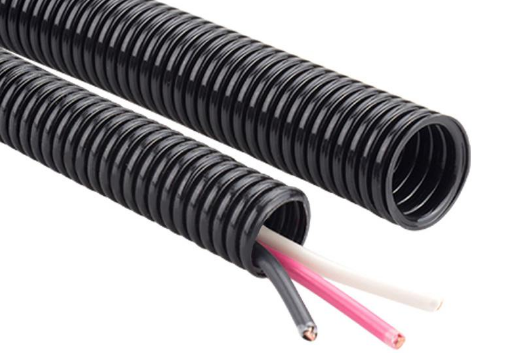Jan. 15, 2024
Non-metallic conduits resist corrosion and are light-weight, reducing installation labor cost. When installed with proper sealing fittings, a conduit will not permit the flow of flammable gases and vapors, which provides protection from fire and explosion hazard in areas handling volatile substances.
Electrical wiring is a critical component of modern infrastructure, and choosing the right conduit is paramount for safety, flexibility, and ease of installation. Flexible non-metallic conduit (FNC) has gained popularity in electrical applications due to its unique set of advantages. In this article, we'll explore the reasons why flexible non-metallic conduit is preferred in electrical wiring installations.
1. Introduction to Flexible Non-Metallic Conduit (FNC)
Flexible non-metallic conduit, also known as liquid-tight flexible conduit, is a versatile solution for protecting electrical wiring in various settings. Unlike traditional metallic conduits, FNC is made from non-metallic materials such as PVC (polyvinyl chloride) or nylon. This construction provides FNC with distinct characteristics that make it suitable for specific electrical applications.
2. Flexibility for Versatile Routing
One of the primary advantages of flexible non-metallic conduit is its inherent flexibility. FNC can easily bend and twist, allowing it to navigate through tight spaces and around obstacles. This flexibility is particularly beneficial in installations where the routing of electrical wiring requires agility and adaptability. FNC's ability to conform to the contours of a space simplifies the installation process, saving time and effort.

3. Corrosion Resistance: Ideal for Challenging Environments
Unlike metallic conduits that may be susceptible to corrosion, FNC is inherently resistant to rust and deterioration. This corrosion resistance makes FNC an ideal choice for installations in challenging environments, such as outdoor applications where exposure to moisture, chemicals, or extreme temperatures is a concern. The longevity of FNC in corrosive conditions contributes to the durability of the overall electrical system.
4. Lightweight Construction: Easy Handling and Installation
Flexible non-metallic conduit is significantly lighter than its metallic counterparts, easing the burden of handling and installation. The lightweight nature of FNC simplifies the transportation and maneuvering of conduit lengths, making it a practical choice for electricians and installers. This characteristic becomes particularly advantageous in overhead installations or situations where ease of handling is crucial.
5. Resistance to Electromagnetic Interference (EMI) and Radio-Frequency Interference (RFI)
Flexible non-metallic conduit provides a degree of insulation against electromagnetic interference (EMI) and radio-frequency interference (RFI). This is especially important in sensitive electronic environments where the protection of signals from external interference is critical. The non-metallic construction of FNC acts as a barrier, helping to maintain the integrity of electrical signals within the conduit.
6. Cost-Effectiveness: Budget-Friendly Solution
FNC offers a cost-effective alternative to metallic conduits. The materials used in the construction of FNC are generally more affordable than metals like steel or aluminum. Additionally, the lightweight and flexible nature of FNC contribute to cost savings in terms of transportation and installation labor. This cost-effectiveness makes FNC an attractive option for projects with budget constraints.
7. UV Resistance: Suited for Outdoor Applications
For outdoor electrical installations, exposure to ultraviolet (UV) radiation is a consideration. Flexible non-metallic conduit is designed with UV-resistant properties, ensuring that it can withstand prolonged exposure to sunlight without degrading or becoming brittle. This UV resistance makes FNC an excellent choice for outdoor applications, such as wiring installations in solar energy systems or outdoor lighting projects.
Closing Thoughts: The Advantages of Choosing Flexible Non-Metallic Conduit
In conclusion, the unique characteristics of flexible non-metallic conduit make it an essential component in electrical wiring installations. Its flexibility, corrosion resistance, lightweight construction, EMI/RFI protection, cost-effectiveness, and UV resistance collectively position FNC as a versatile and reliable solution for a wide range of applications.
When considering flexible non-metallic conduit for your electrical projects, consulting with a reputable supplier is crucial. Their expertise can guide you in selecting the most suitable conduit for your specific needs, ensuring a successful and compliant installation.
Contact Us for Your Flexible Non-Metallic Conduit Needs: Your Trusted Electrical Solutions Provider
For inquiries or to explore a range of flexible non-metallic conduits tailored to your requirements, feel free to contact us. Trust in our expertise and quality products to enhance the safety and efficiency of your electrical wiring installations.

















